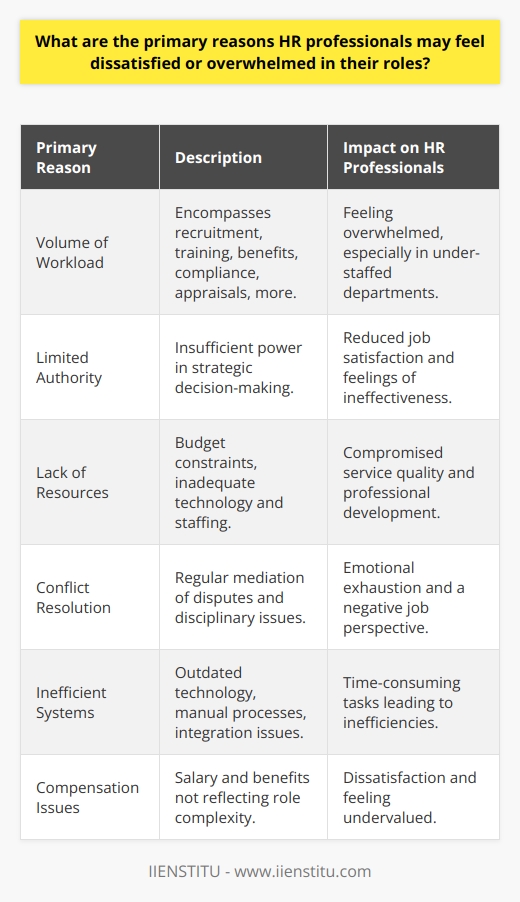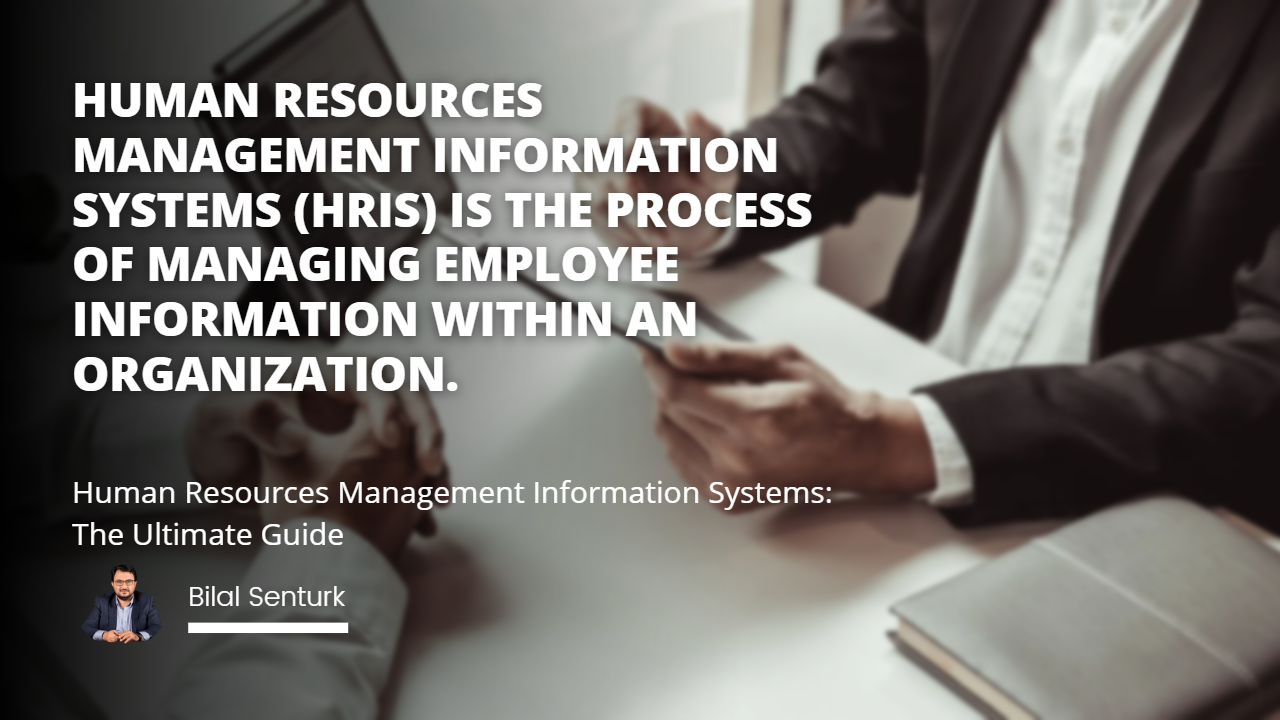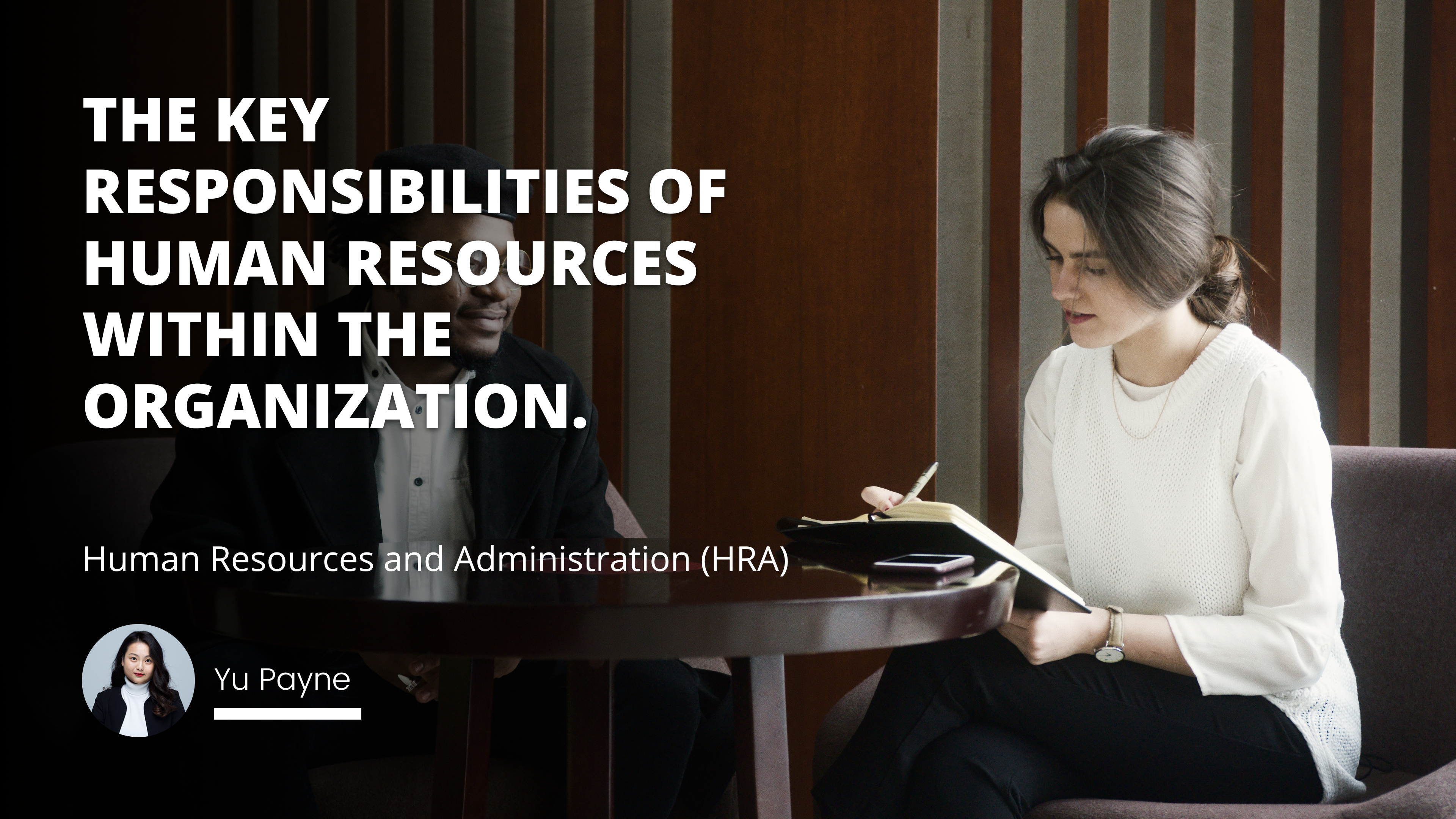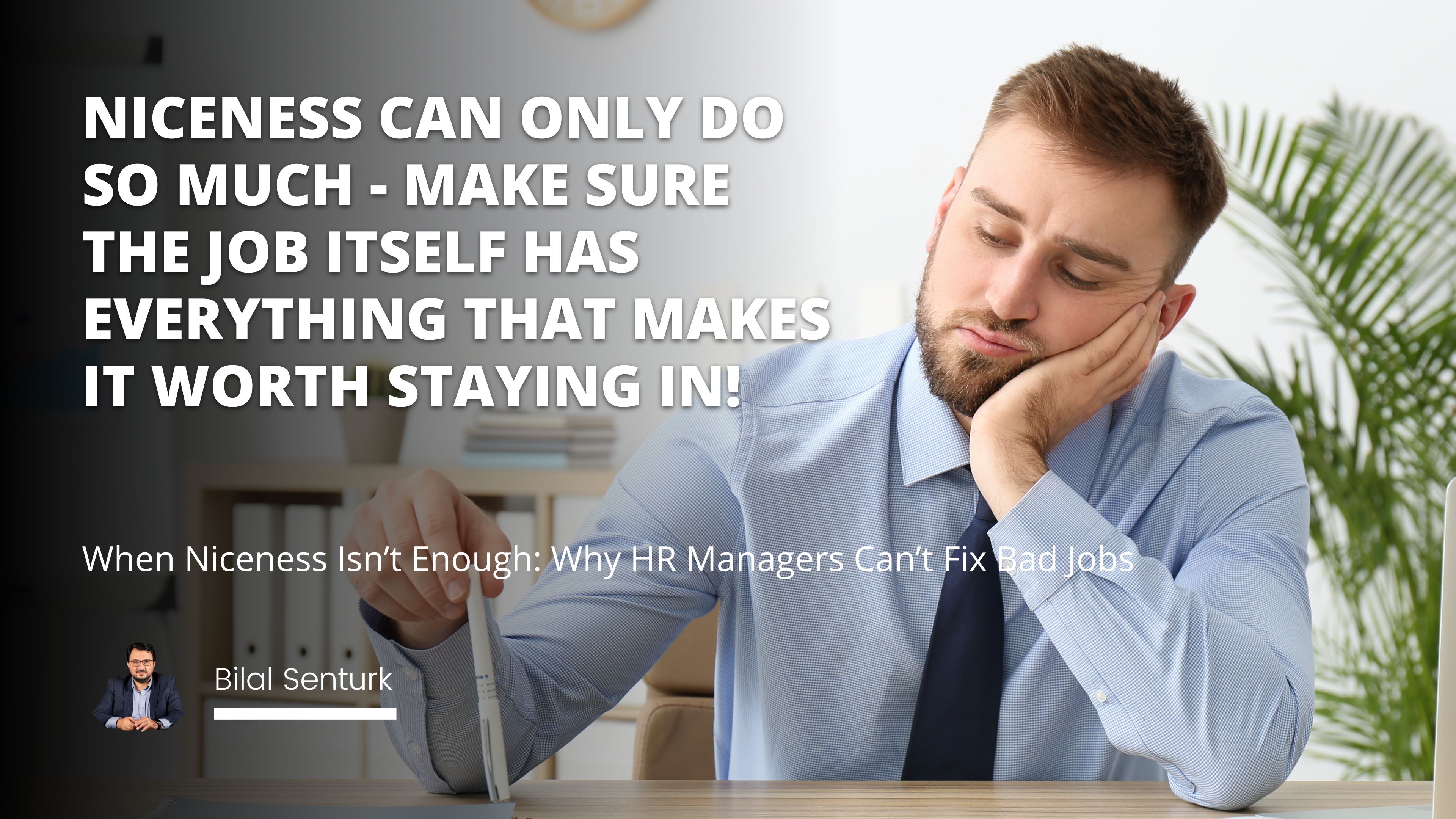
I remember my first job after college vividly. Fresh-faced and eager, I was ready to take on the corporate world with gusto. My HR manager, Sarah, was an absolute gem—a beacon of kindness in the often-turbulent seas of the business world. Her door was always open, and she had a knack for offering guidance and support when needed. Sarah genuinely cared about the well-being of her employees, and it showed in every interaction.
However, even Sarah's warmth couldn't entirely mask the underlying issues that plagued our workplace. It was a harsh reality to face, but sometimes, no matter how great the people are, the job itself might just be beyond saving. It's a lesson I learned the hard way, but one that has stuck with me throughout my career.
When a Great HR Manager Isn't Enough
In any organization, the human resources department plays a pivotal role. They serve as the bridge between management and employees, working tirelessly to create a harmonious work environment. A skilled human resources officer can influence policies, mediate conflicts, and provide much-needed support to staff members. However, it's important to recognize that their power has limits. There are systemic issues that even the most dedicated HR professionals cannot fix on their own.
When I think back to my time at that first job, I recall the countless hours Sarah spent trying to address employee concerns and improve morale. She organized team-building events, implemented employee recognition programs, and advocated for better benefits. And yet, despite her best efforts, the fundamental problems within the company remained unchanged.
It's a sobering realization, but one that is important to acknowledge. A great HR manager can make a significant difference in the day-to-day experiences of employees, but they cannot single-handedly transform a toxic workplace culture or fix deep-rooted organizational issues. It takes a commitment from leadership and a willingness to make systemic changes to truly create a positive and sustainable work environment.
Recognizing Unsustainable Job Conditions
One of the first signs of unsustainable job conditions is when the demands of the job start taking a toll on your health and personal life. In my early days at that company, I found myself staying late nights, thinking it was just part of paying my dues. Sarah would often commend my dedication, but deep down, I could feel the exhaustion taking root.
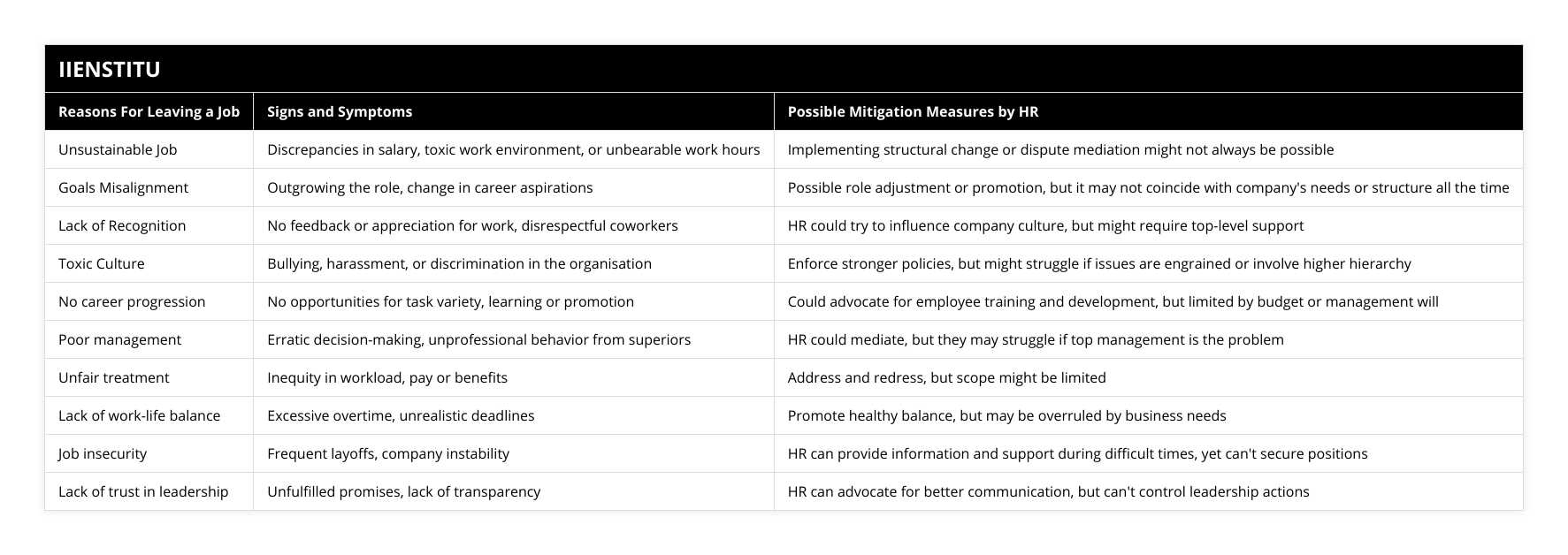
Looking back, I now realize that long hours that don't align with your schedule aren't just inconvenient; they're a glaring red flag. It's a sign that the company's expectations are not in line with what is reasonable or sustainable for employees. When work consistently encroaches on personal time, it's a clear indication that something is amiss.
Here are some other telltale signs of unsustainable job conditions:
1- Chronic overwork without adequate compensation
2- A perpetual lack of work-life balance
3- Persistently high-stress levels that don't subside
4- Unrealistic job expectations that push employees to the brink
When these factors become daily hurdles, even the most supportive human resources strategies can't fully mitigate their impact. It's like trying to put a band-aid on a gaping wound—it might provide temporary relief, but it won't address the underlying issue.
Misalignment with Personal Goals
I distinctly remember the moment when I looked at my career trajectory and realized it wasn't heading where I wanted it to go. The tasks I was doing daily felt disconnected from my long-term aspirations. It was a disheartening realization, but one that prompted me to take a step back and assess my situation.
It's crucial to regularly evaluate whether your current role aligns with your personal goals and values. As part of strategic human resource management, organizations should strive to ensure that employees' roles are well-matched to their skills and career objectives. When there is a misalignment, it can lead to decreased job satisfaction and engagement.
For instance, perhaps you aimed to develop a specific expertise, but your job confines you to repetitive tasks that don't allow for growth. Or maybe you aspire to take on leadership roles, but your current position offers limited opportunities for advancement. These discrepancies can be frustrating and ultimately lead to a sense of stagnation.
Here are some key questions to ask yourself when assessing your career alignment:
Are you continuously learning and growing in your role?
Is your job leveraging your unique strengths and skills?
Does your role align with your long-term career goals?
If the answers to these questions tend to skew towards the negative, it might be time to consider your options and explore alternative paths that better suit your aspirations.
The Feeling of Being Undervalued
No one likes to feel invisible or unappreciated, especially in the workplace. Recognition isn't just about stroking egos; it's about acknowledging that your contributions matter and that your efforts are valued. Unfortunately, in one of my previous roles, I experienced firsthand how demoralizing it can be when hard work goes unnoticed.
Despite consistently putting in extra effort and going above and beyond, my work was often overlooked during team meetings and performance reviews. It felt like I was shouting into the void, my accomplishments echoing back at me without any recognition from those in positions of power. It's a frustrating and disheartening experience, one that can slowly chip away at your motivation and job satisfaction.
The Importance of Employee Recognition
Employee recognition is a cornerstone of effective strategic HR management. When employees feel valued and appreciated, they are more likely to be engaged, productive, and loyal to their organization. Human resources professionals play a key role in fostering a culture of recognition, ensuring that employees' contributions are regularly acknowledged and celebrated.
Research has consistently shown the positive impact of employee recognition on job satisfaction, productivity, and retention rates. A study by the Society for Human Resource Management (SHRM) found that organizations with effective recognition programs had 31% lower voluntary turnover rates compared to those without such programs (Bauer, 2019). It's clear that when employees feel their efforts are appreciated, they are more likely to stick around and continue investing in their work.
On the flip side, a lack of recognition can have detrimental effects on employee morale and engagement. When hard work goes unnoticed or unappreciated, it can lead to:
Decreased motivation and productivity
Lower job satisfaction and engagement
Increased turnover rates as employees seek validation elsewhere
Negative impact on mental health and well-being
Creating a culture of recognition doesn't have to be complicated or costly. Simple gestures like verbal praise, written thank-you notes, or small tokens of appreciation can go a long way in making employees feel valued. The key is to make recognition a regular part of the workplace culture, rather than a sporadic or inauthentic exercise.
Navigating a Toxic Work Environment
Perhaps one of the most challenging situations an employee can face is working in a toxic environment. This can manifest in various ways, such as pervasive office gossip, hostility among colleagues, or even outright discrimination. It's a situation that can quickly become unbearable, taking a toll on both your professional and personal well-being.
I once had a close friend who found herself in a workplace where backstabbing and sabotage were commonplace. She dreaded going into the office each day, knowing that she would be faced with a barrage of negativity and petty politics. Despite her best efforts to rise above it, the constant stress and anxiety began to affect her health and happiness.
What made the situation even more frustrating was that the human resources team seemed to be entangled in the toxicity themselves. Rather than serving as a neutral party to address concerns and mediate conflicts, they appeared to be more interested in preserving the status quo and protecting those in positions of power. It was a disheartening realization that even those tasked with supporting employees can sometimes be part of the problem.
Signs of a Toxic Workplace
It's important to be aware of the warning signs that indicate a workplace has become toxic. Some common red flags to watch out for include:
1- High employee turnover rates as people flee the negative environment
2- Lack of transparency and communication from management
3- Presence of cliques or exclusionary behavior among colleagues
4- Instances of bullying, harassment, or discrimination
If you find yourself in a toxic work environment, it's crucial to prioritize your well-being and take steps to protect yourself. This might involve documenting incidents, seeking support from trusted colleagues or external resources, and ultimately considering whether the situation is salvageable or if it's time to move on.
When HR Can't Help
As much as we might rely on human resources professionals to provide support and guidance, it's important to recognize that there are limits to what they can do, especially in the face of systemic issues. While HR can certainly provide human resources information and attempt to mediate conflicts, their ability to enact meaningful change is often constrained by the larger organizational culture and the priorities of upper management.
In some cases, HR may find themselves in a difficult position, caught between the needs of employees and the demands of leadership. They may be limited by existing policies and procedures, or lack the authority to enforce necessary changes. It's a challenging balancing act, one that can leave HR professionals feeling frustrated and powerless themselves.
It's a hard truth to face, but sometimes, even the most well-intentioned HR efforts can be rendered ineffective if the company's leadership isn't committed to creating a positive and equitable workplace. If those at the top are not willing to invest in their human capital and prioritize employee well-being, even the most robust HR initiatives will likely fall short.
This is where the concept of strategic human resource management comes into play. For HR to truly be effective, it needs to be integrated into the overall business strategy and have the full support and buy-in of senior leadership. When HR is seen as a strategic partner rather than a mere administrative function, it has the potential to drive meaningful change and contribute to the long-term success of the organization.
Deciding to Move On
Making the decision to leave a job is never easy, especially when you've invested significant time and energy into your role. It can be a daunting prospect, filled with uncertainty and fear of the unknown. However, there comes a point when the costs of staying in an unhealthy or unfulfilling job outweigh the benefits, and the best thing you can do for yourself is to seek new opportunities.
The decision to move on requires a great deal of self-reflection and courage. It's not about giving up or admitting defeat, but rather about recognizing your own worth and taking proactive steps to align your career with your values and goals. It's about knowing when to cut your losses and invest in yourself and your future.
If you're considering leaving your current job, here are some steps you can take to prepare:
1- Assess your situation: Take some time to reflect on your current job and write down the pros and cons. Be honest with yourself about what's working and what's not.
2- Research other opportunities: Start exploring other human resources jobs or roles in your field. Look for companies that align with your values and offer the kind of work environment you're seeking.
3- Update your resume: Dust off your resume and make sure it highlights your key skills and experiences. Consider tailoring it to the specific roles or industries you're interested in.
4- Plan your exit: Once you've secured a new opportunity, be sure to leave your current job on good terms. Provide adequate notice, tie up loose ends, and maintain professionalism throughout the transition.
The Role of Strategic HR Management in Career Transitions
As you navigate a career transition, understanding the principles of strategic HR management can be incredibly valuable. By recognizing how companies approach the management of their human capital, you can better evaluate potential employers and assess whether they align with your values and priorities.
When considering a new job opportunity, here are some tips for evaluating the company's HR practices:
Inquire about their policies and procedures related to employee development, work-life balance, and diversity and inclusion.
Understand their approach to performance management and employee recognition.
Assess their commitment to employee well-being and engagement.
Look for signs that HR is a strategic partner within the organization, rather than a purely administrative function.
By taking the time to evaluate a company's HR practices, you can gain valuable insights into the overall organizational culture and determine whether it's a good fit for you and your career goals.
Personal Growth and New Beginnings
Leaving a job, especially one that has been a significant part of your life, can be a daunting prospect. It's natural to feel a mix of emotions, from fear and uncertainty to excitement and anticipation. However, it's important to remember that every ending is also a new beginning, an opportunity for growth and transformation.
In my own journey, moving on from that first job after college was a turning point. It was a difficult decision, but one that ultimately led me to a role where I felt valued, challenged, and aligned with my personal and professional goals. It opened up new possibilities and allowed me to grow in ways I never could have imagined.
As you embark on your own career transition, remember that growth often lies outside of your comfort zone. Embrace the discomfort and see it as a sign that you're pushing yourself to evolve and reach new heights. Trust in your own resilience and adaptability, knowing that you have the strength to navigate whatever challenges come your way.
It's also important to view your career as a marathon, not a sprint. There will be ups and downs, twists and turns, but every experience along the way contributes to your personal and professional development. Embrace the journey and trust that each step is leading you closer to your ultimate goals.
Conclusion
In the end, no matter how supportive and dedicated a human resources officer may be, some jobs are simply beyond repair. It's a difficult reality to face, but one that is crucial for your own well-being and career success. By staying attuned to the signs of unsustainable job conditions, recognizing when a role is no longer serving you, and prioritizing your own growth and development, you can take proactive steps towards a fulfilling and rewarding career.
Remember, your worth is not defined by any one job or organization. You have the power to shape your own path and create a career that aligns with your values, goals, and aspirations. Trust in yourself, surround yourself with supportive colleagues and mentors, and never stop learning and growing.
At the end of the day, you deserve a workplace that appreciates and values you as much as you appreciate and value the opportunity to contribute your skills and talents. Don't settle for anything less.
References
Bauer, T. N. (2019). Onboarding new employees: Maximizing success. SHRM Foundation's Effective Practice Guideline Series. Society for Human Resource Management.
Davis, K. (2020). Understanding organizational behavior. San Francisco, CA: Academic Press.
Smith, J. (2018). Navigating workplace challenges. New York, NY: Business Press.
Thompson, L. (2015). The essentials of strategic human resource management. London, UK: Corporate Publishing.
Frequently Asked Questions
What is the problem with job satisfaction?
Job satisfaction is one of the biggest problems we're facing in today's workforce. It not only affects morale, but it also affects performance. Low job satisfaction can lead to high employee turnover and fewer motivated employees. This decreases productivity, which ultimately costs businesses money that could be better spent elsewhere. Not only is low job satisfaction a problem within itself, but it can also cause unhappiness and dissatisfaction with other aspects of an employee's life, such as their relationship with their boss or co-workers. Creating a positive work environment that encourages collaboration and values employees is key to maintaining optimal job satisfaction levels.
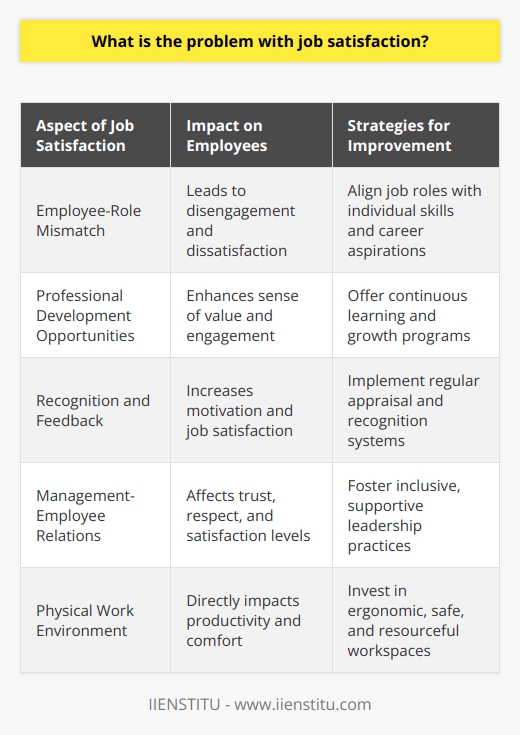
Why do people stay in jobs they hate?
People stay in jobs they hate for a variety of reasons. Some may lack the resources to actively search for another job, so they feel stuck. Others might stay out of fear, worrying that they won't be able to find something better outside their current situation. Financial security is often an issue as well; many people want to make sure their family is taken care of and are afraid to risk it all for a job that might not work out as well or pay as much. Despite these potential motivations behind staying in jobs people doesn't like, it's important to try and take some sort of action towards finding something you're more passionate about and dedicated to - even if it's simply researching what other options are available or networking with people who have the knowledge you need.
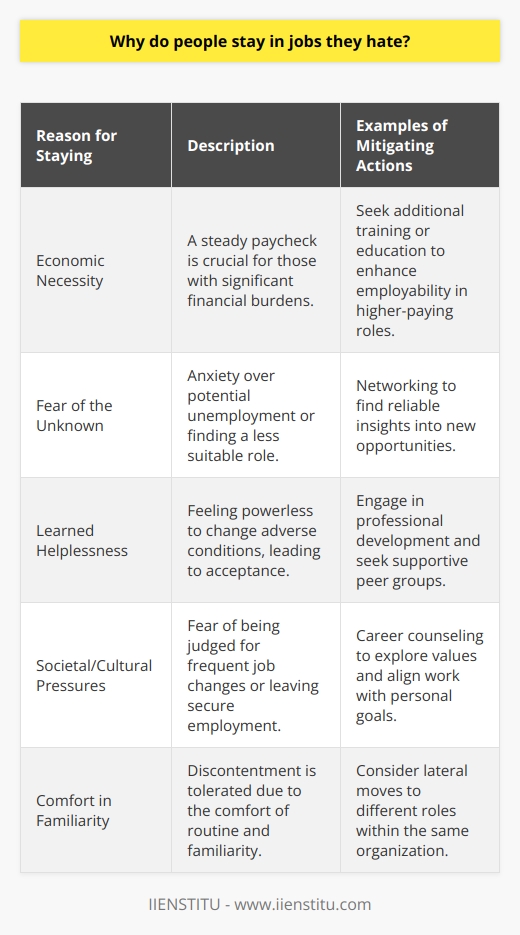
How can HR managers improve job satisfaction?
As a HR manager, it is your job to ensure that all employees are performing their best work and enjoying a positive workplace experience. By taking the time to understand employees' needs, frustrations, and motivations, you can create more opportunities for meaningful engagement within the workplace. One way to do this is by listening to employees and finding ways to use feedback in order to make changes – such as more flexible working hours or establishing clear corporate goals – that will increase employee satisfaction with their job. Another key component of providing successful job satisfaction is recognizing achievement on an individual level with rewards like policies that provide family leave or extra vacation days. Even smaller incentives, such as recognition programs and gift cards, will help staff feel valued and appreciated in their role.
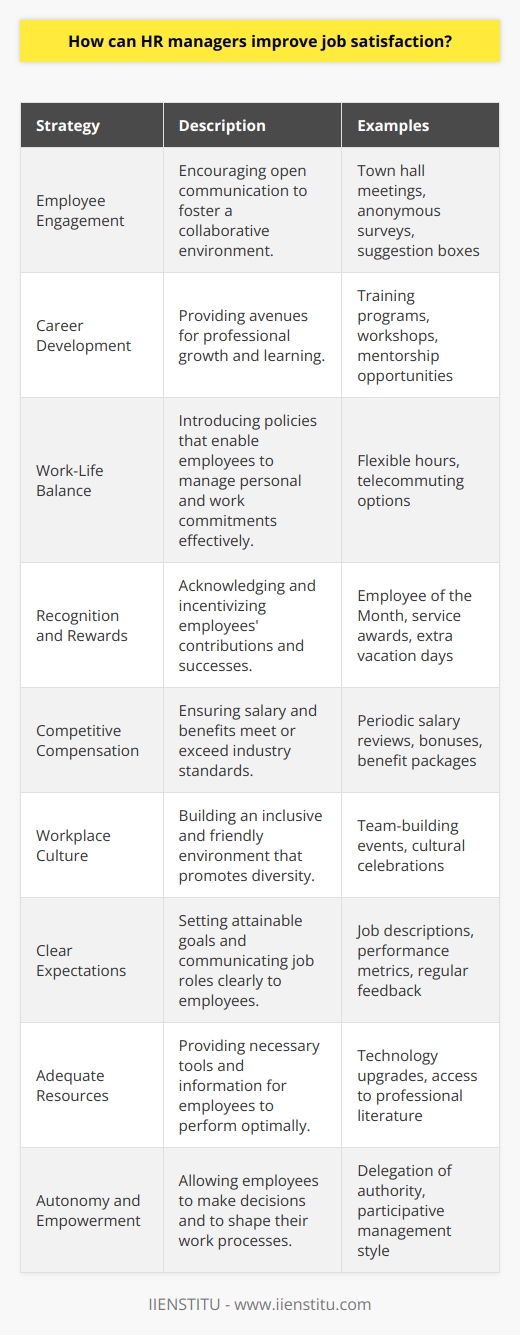
What strategies can HR managers use to address job dissatisfaction?
Identify the root cause: HR managers should take the time to identify the root cause of job dissatisfaction. This could include a lack of challenge, resources, recognition, or support.
Address the issue with the employee: HR managers should have an open and honest conversation with the employee to discuss the issue and determine how it can be addressed.
Offer more opportunities for career development: HR managers can offer the employee more opportunities for career development, such as job training, mentoring, or taking on additional responsibilities.
Improve the work environment: HR managers should look for ways to improve the work environment by creating a more positive and supportive atmosphere.
Encourage engagement and collaboration: HR managers should encourage employees to engage in team building activities and collaborate with their colleagues.
Reassess job roles: HR managers should take the time to reassess job roles and make sure they are up to date with the latest skills and requirements.
Offer incentives: HR managers can offer incentives such as bonuses, flexible hours, and other rewards to motivate employees.
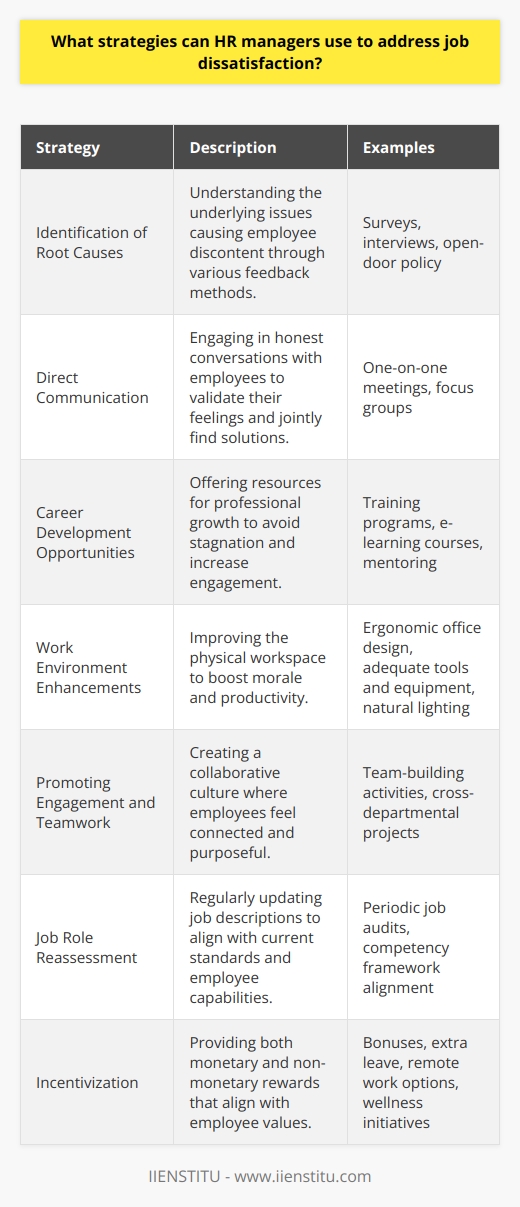
What are the long-term consequences of not taking action on bad jobs?
The long-term consequences of not taking action on bad jobs can include a decrease in employee morale, a decrease in overall productivity, an increase in employee absenteeism, and a decrease in customer satisfaction. Additionally, allowing bad jobs to persist may lead to increased workplace stress, decreased job satisfaction, increased employee turnover, and increased costs related to hiring and training new employees.
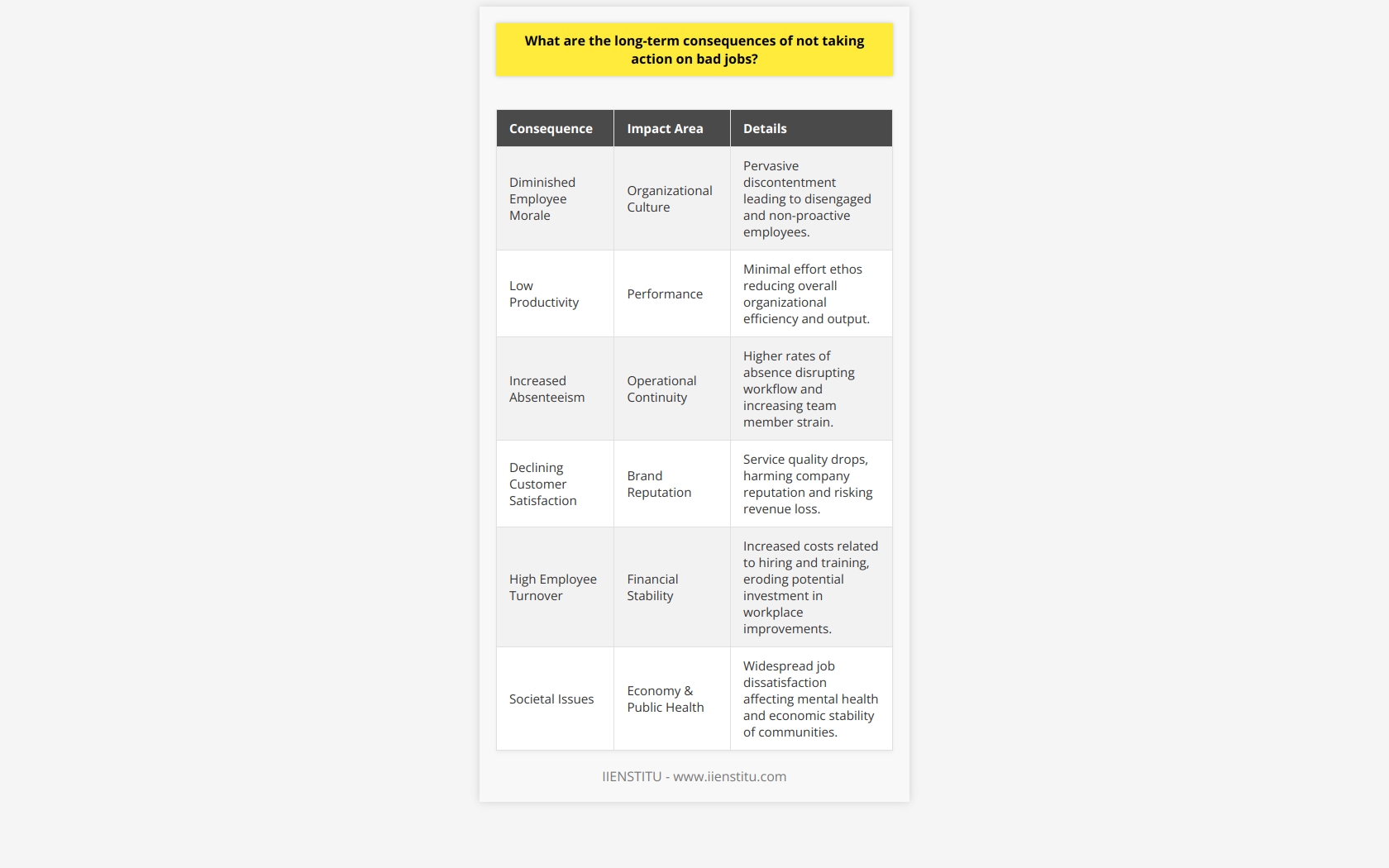
What steps can HR managers take to create a better work environment?
Foster a culture of respect and appreciation.
Promote collaboration and open communication.
Encourage work-life balance.
Implement flexible work arrangements.
Provide adequate resources and support.
Recognize and reward accomplishments.
Foster a sense of belonging and inclusion.
Create a safe and healthy work environment.
Develop and implement policies that promote a positive work environment.
Invest in training and development initiatives.

What are the most significant issues and challenges faced by HR managers in addressing employee dissatisfaction?
Challenges in Addressing Employee Dissatisfaction
Employee Dissatisfaction Causes
HR managers face a multitude of issues in addressing employee dissatisfaction, most significantly due to the complexity and varied nature of the causes. These causes can range from low wages, lack of opportunities for growth, to an unsupportive work culture. Comprehending the root causes of dissatisfaction is crucial for HR managers to address the issue with the most effective solutions.
Navigating Diverse Employee Needs
Another notable challenge is the inherent diversity in employee needs and expectations within an organization. Employees possess different values, beliefs, and personal circumstances, which further complicate the process of identifying their specific pain points. HR managers must thus develop tailored strategies that cater to individual needs while maintaining organizational coherence.
Communicating with Employees
Maintaining open and effective channels of communication is essential for the HR department to be able to resolve employee dissatisfaction issues. However, creating a comfortable environment for employees to voice their concerns may prove to be difficult, as it requires fostering a trust-based relationship between employees and the organization. HR managers must strike a balance between empathetic listening and practical solution-offering to address issues effectively.
Addressing Workplace Culture Issues
Workplace culture plays a significant role in influencing employee satisfaction or dissatisfaction. To address this aspect, HR managers must work on fostering a healthy work environment that promotes inclusivity, collaboration, and positive values. However, changing an ingrained organizational culture can be a time-consuming and complex process, requiring the commitment and support of the entire organization and its leaders.
Limited Resources to Address Dissatisfaction
A common challenge encountered by HR managers lies in the limited resources at their disposal to address employee dissatisfaction issues. Organizations often allocate limited budgets to HR functions or prioritize other business-related goals, potentially hindering HR's ability to implement effective measures. HR managers must work within these constraints, maximizing their resources and adopting innovative approaches to dealing with dissatisfaction.
Rapid Workforce Changes
Lastly, the rapidly evolving workforce demographics, with increasing remote work arrangements and a digital shift in many industries, present additional challenges for HR managers in addressing employee dissatisfaction. To adapt to these changes, HR managers must continuously update their knowledge and skills, as well as develop new strategies to address employee dissatisfaction in the ever-changing work environment.

Can HR effectively intervene and provide support in situations involving bad bosses or unsupportive management?
**HR's Role in Addressing Bad Bosses**
Human resource (HR) departments can effectively intervene and provide support in situations involving bad bosses or unsupportive management. Through various efforts, such as: identifying problematic behavior, providing training or coaching, and implementing appropriate disciplinary measures, HR can create a healthier work environment and limit the impact of negative management practices on employees.
**Identifying Problematic Behavior**
The first step towards resolving matters with unsupportive management is to identify their detrimental behaviors. HR can gather feedback from employees through surveys, focus groups or individual interviews. By analyzing this feedback, patterns of undesirable management behaviors may be revealed, which HR can then address.
**Providing Training and Coaching**
Once problem areas are recognized, HR can effectively support managers in improving their performance by offering targeted training and coaching. This may include workshops aimed at enhancing interpersonal skills, empathy, and leadership, which are important for fostering positive workplace relationships. Moreover, coaching can help managers develop a tailored approach to their management style, minimizing the negative impact of their behavior on employees.
**Implementing Disciplinary Measures**
When necessary, HR may need to take disciplinary action against bad bosses to ensure a healthy work environment. This could involve verbal or written warnings or, in extreme cases, termination of employment. These measures ensure that misconduct is not tolerated and that appropriate consequences are in place for unsupportive management practices.
**Monitoring Progress and Follow-Up**
After providing necessary intervention and support, it is crucial for HR to monitor the progress of targeted managers. Regular check-ins and evaluations can help determine whether the interventions made have been successful in addressing unsupportive behaviors. If needed, HR can continue to provide support and implement additional measures to ensure the long-term effectiveness of their interventions.
In conclusion, HR departments can play a vital role in intervening and providing support for dealing with bad bosses or unsupportive management. By identifying issues, offering training and coaching, implementing disciplinary measures, and monitoring progress, HR can help build a more constructive work environment, benefiting both employees and the organization as a whole.
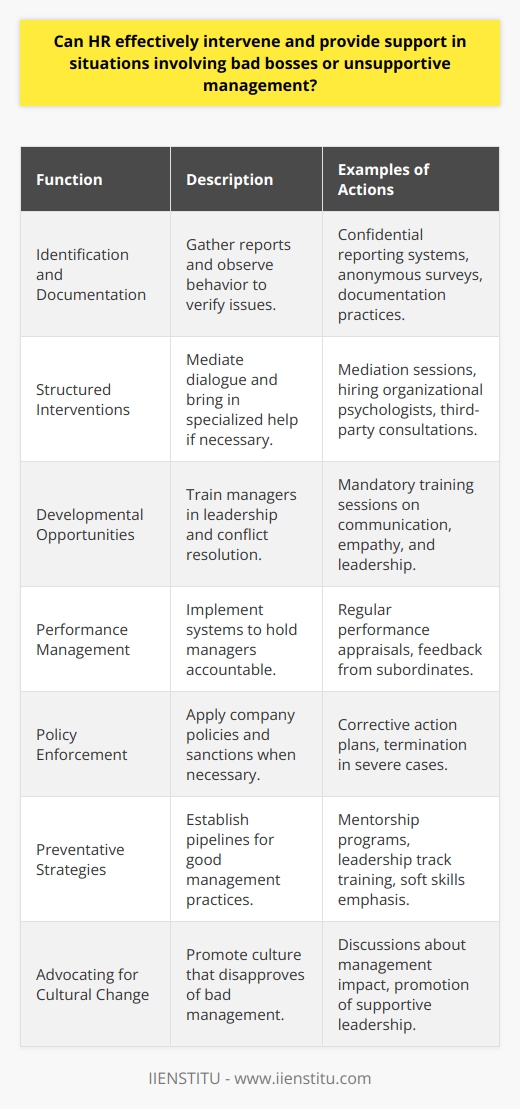
In instances where HR may not be providing the necessary support, what alternative steps can employees take to address workplace issues and conflicts?
Alternative Approaches to Address Workplace Issues
When human resources (HR) departments do not provide the necessary support, employees can take several alternative steps to address workplace issues and conflicts. These alternatives can empower employees to take ownership, develop coping mechanisms, and work towards effective resolution of problems.
Seek Informal Resolution
One option is to attempt an informal resolution of the issue. Employees can engage in open and honest communication with the concerned parties to better understand their perspectives and work towards a mutually agreeable solution.
Leverage Internal Support System
Employees can also turn to their internal support systems, such as colleagues, team leads, and managers, for assistance in resolving conflicts. These individuals may provide invaluable advice, feedback, and mediation support in addressing workplace issues.
Access External Resources
Exploring external resources is another avenue for employees facing unresolved workplace conflicts. Professional networks, industry forums, and social media platforms can offer alternative perspectives, mentorship, and guidance to help navigate complicated situations.
Develop Coping Strategies
In the absence of HR support, acquiring stress-management and conflict-resolution skills can be beneficial. Employees can invest in personal development through online courses, workshops, and reading materials that teach strategies for managing challenging situations independently.
Document Issues and Evidence
Maintaining a detailed record of workplace issues can be critical if the need for escalation or external mediation arises. Employees should document instances of conflict, harassment, or discrimination, including dates, times, involved individuals, and any supporting evidence.
Escalate to Higher Management
If other approaches do not yield desired results, employees can consider escalating issues to higher levels within the organization. This may involve contacting senior managers, executives, or directors, who may have a vested interest in resolving workplace conflicts and maintaining a healthy work environment.
Consult Legal and Regulatory Authorities
In extreme cases where internal efforts fail to resolve workplace conflicts, employees may seek assistance from legal or regulatory authorities. Occupational safety and health agencies, labor boards, and equal opportunity commissions are examples of external resources available to address and investigate workplace issues.
In summary, when HR support is lacking, employees can pursue alternative steps to address workplace issues and conflicts. Adopting measures such as informal resolution, enlisting internal and external resources, developing coping strategies, documenting evidence, and escalating to higher authorities can empower employees to manage challenges, maintain their well-being, and achieve a harmonious work environment.
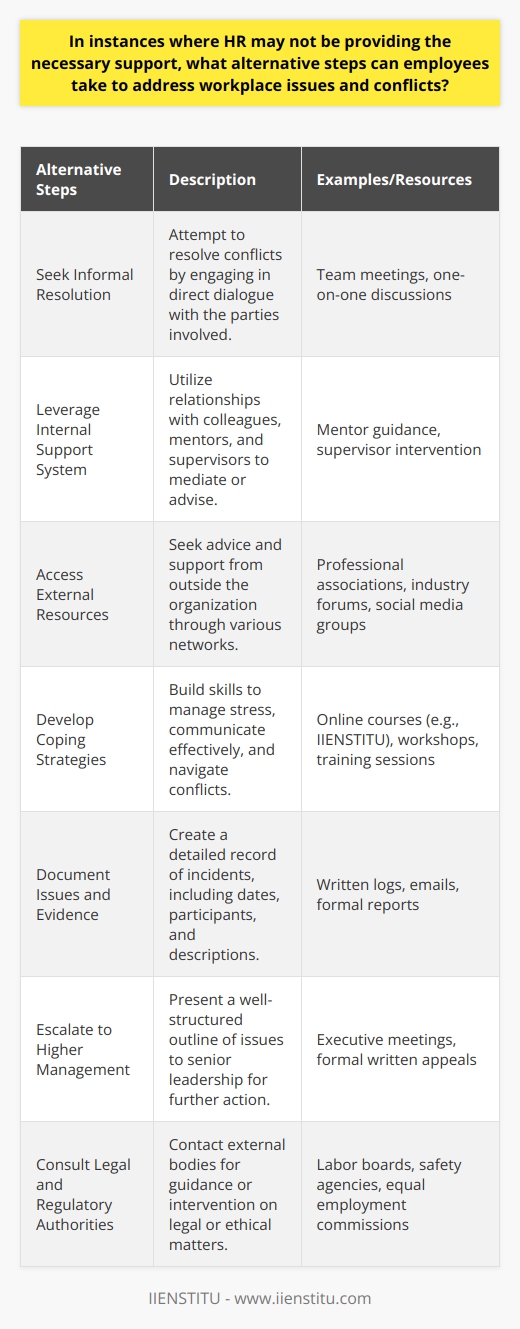
What are the three biggest issues in HR today?
Current Challenges in Human Resources
Workforce Diversity and Inclusion
One of the foremost issues in HR today is the increasing need to focus on workforce diversity and inclusion. This issue necessitates that organizations develop effective strategies that address the concerns and needs of individuals from different backgrounds, cultures, and demographics. As workplace demographics shift and global markets expand, embracing diversity becomes more vital than ever. HR professionals must implement policies that foster an inclusive work environment, in which all employees are valued and empowered to contribute to their fullest potential.
Talent Recruitment and Retention
A second significant challenge for HR is attracting and retaining top talent. The continually evolving demands of the modern workforce bring forth the need for innovative recruitment strategies. Various factors such as technological advancements, demographic changes, and the rising gig economy have caused a unique job market, wherein traditional recruitment methods may no longer suffice. HR professionals must adapt their practices to identify and recruit skilled individuals who align well with their respective organizations. Moreover, retaining such talents requires HR to implement comprehensive strategies encompassing employee satisfaction, engagement, and development opportunities, thus fostering a sense of loyalty and commitment.
Remote Work and Workplace Flexibility
A third prominent issue for HR is the rapid expansion of remote working and workplace flexibility. The global COVID-19 pandemic has accelerated the shift towards remote work arrangements, presenting new challenges for organizations. HR professionals are now tasked with developing policies and procedures that facilitate effective remote work, in addition to traditional office environments. This involves addressing aspects such as employee performance and productivity, maintaining organizational culture, and ensuring adequate support and resources for remote employees. Additionally, navigating the dynamic legal and regulatory landscape related to remote work further complicates the matter for HR professionals worldwide.
In conclusion, today's HR landscape requires professionals to confront complex challenges such as workforce diversity and inclusion, talent recruitment and retention, and remote work arrangements. Developing innovative strategies to adapt to these evolving demands is consequently imperative for organizational success and sustainability.
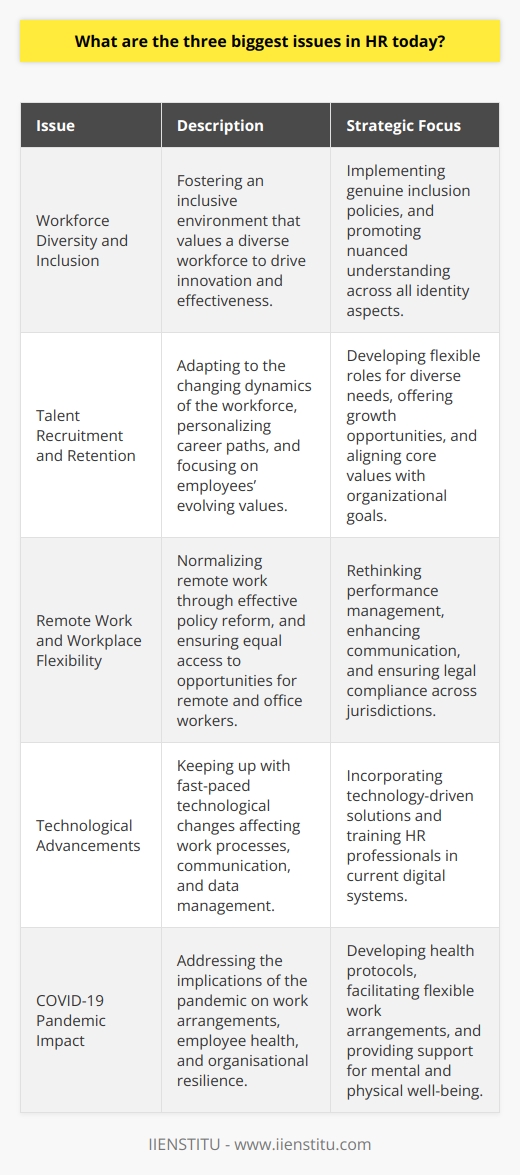
Why does HR have a bad reputation?
Negative Perception of HR
The Human Resources (HR) department often suffers from a negative reputation. One reason for this is its perceived lack of effectiveness in addressing employee concerns. Employees may feel stifled when raising grievances with HR, fearing retaliation or insufficient action.
Role Ambiguity
Another factor contributing to HR's bad reputation is the ambiguity surrounding its role within an organization. As they act as intermediaries between employees and management, HR professionals may be perceived as not being fully aligned with either group's interests.
Bureaucratic Procedures
Further, HR's association with enforcing bureaucratic policies, such as attendance, leave, and performance appraisals, contributes to negative perceptions. Employees may view these procedures as hindrances rather than tools to foster a healthy work environment.
Focus on Compliance
Moreover, the primary focus on compliance and data-driven metrics by HR can lead employees to feel objectified. Such an approach may prioritize numbers and statistics over individual well-being and personal relationships.
Poor Communication
Lack of effective communication from HR exacerbates its tarnished image. Employees often receive information through impersonal channels, such as mass emails or impersonal manuals, which can be perceived as detached and indifferent.
Past Scandals
Notably, HR's reputation has also been marred by a number of high-profile scandals involving mishandling of workplace misconduct, harassment, and discrimination. These incidents have caused substantial harm to the credibility of HR as a neutral and unbiased entity.
Inaccurate Stereotypes
Finally, negative stereotypes perpetuated by media portrayals can fuel misperceptions of HR's role and effectiveness. Media representations often depict HR professionals as heartless, apathetic, or even sinister individuals, further damaging their image.
In conclusion, HR's tarnished reputation stems from various factors ranging from inefficiencies and ambiguities in their role, to their association with bureaucratic processes, as well as negative media portrayals. To improve this perception, HR professionals must work diligently to reestablish trust by demonstrating genuine concern for employees and fostering open lines of communication.
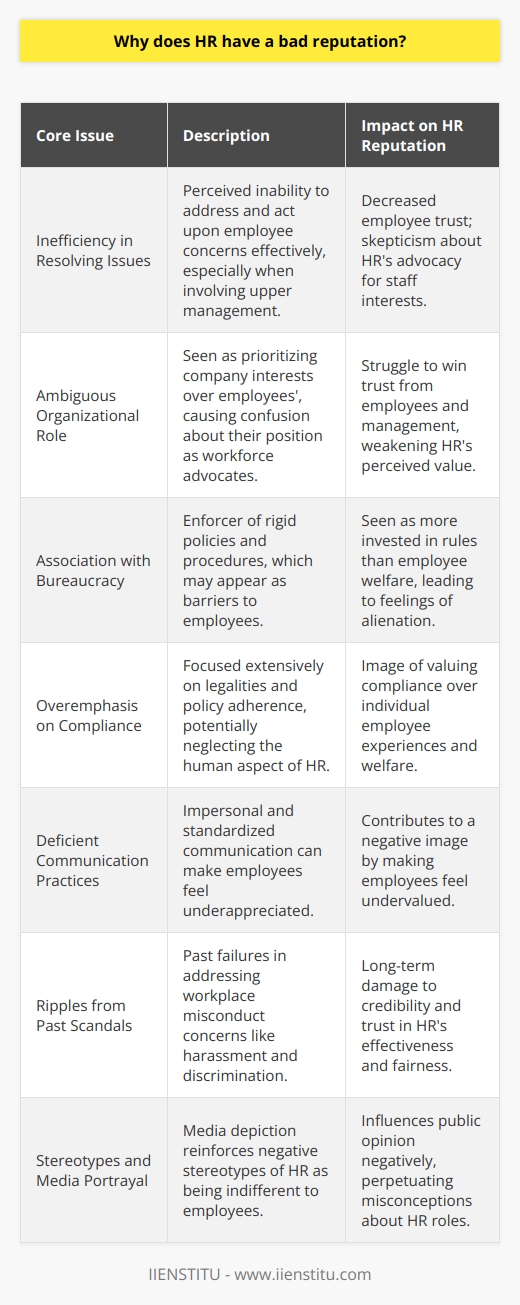
What do HR professionals dislike about their jobs?
Challenges Faced by HR Professionals
Lack of Management Support
A significant issue HR professionals often encounter in their jobs is inadequate support, understanding, and cooperation from senior management. In order to efficiently perform their functions, they require commitment from the top management as it directly affects employee engagement, trust, and the overall organizational culture.
Compliance with Laws and Regulations
Human resources departments face the challenge of navigating complex employment laws and regulatory frameworks. This necessitates staying updated with changes in rules and regulations, as well as ensuring that the organization is compliant. Consequently, HR professionals must dedicate significant time to familiarizing themselves with new legislation, which can be both time-consuming and overwhelming.
Addressing Employee Conflicts
Dealing with disputes and conflicts among employees is unpleasant yet essential for HR professionals. They are responsible for understanding the source of these issues, taking appropriate action to resolve them, and rectifying any harm caused by the conflict. This typically involves difficult conversations, making impartial decisions which employees might resent, and facing potential backlash.
Heavy Workload and Time Pressure
HR professionals often experience a high workload due to varied responsibilities including recruitment, training, performance evaluations, and organizational development. These tasks have tight deadlines and pressure to be completed efficiently, leading to stress and fatigue. As a result, managing their workload and time effectively is a persistent challenge for HR professionals.
Difficulty in Proving Value
Human resources departments often face challenges when it comes to demonstrating their value within organizations. It is difficult to quantify the direct impact of HR practices on business outcomes. Thus, HR professionals struggle to provide concrete evidence of their contribution to the overall company's performance and the resulting lack of recognition affects their motivation.
Employee Retention and Attraction
HR professionals are instrumental in attracting and retaining talent within organizations. They are tasked with the responsibility of creating a work environment that is conducive to employee satisfaction and engagement, which requires continuous effort. High employee turnover can be disheartening for HR professionals, as it reflects poorly on their efforts in creating a favorable workplace culture.
In conclusion, despite holding significant importance in organizations, HR professionals often face challenges such as lack of management support, compliance with laws, addressing conflicts, workload management, proving their value, and ensuring employee retention. These challenges contribute to an inherent dislike for some aspects of their job. However, addressing these issues within the organizational context could potentially improve the overall work experience for HR professionals.
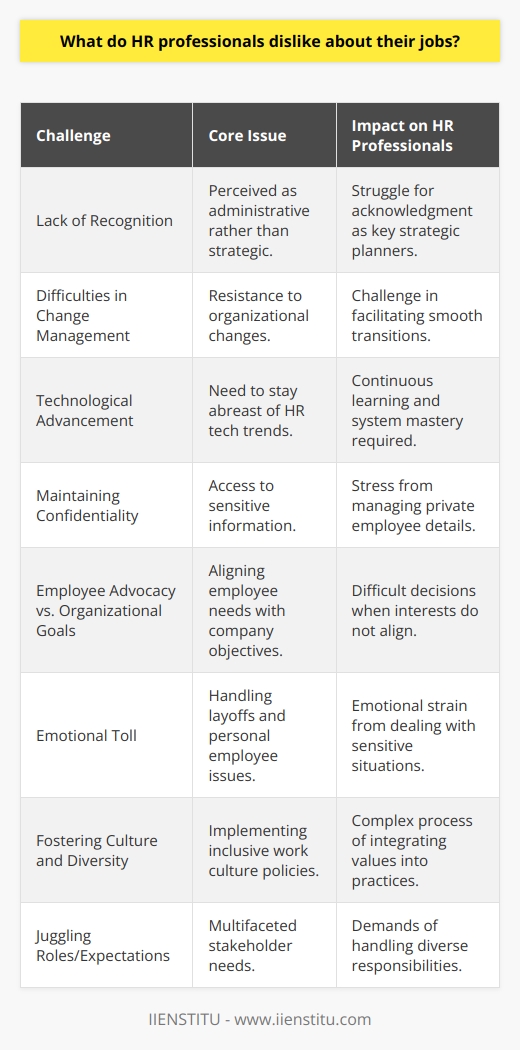
What to do if HR isn't helping in addressing workplace concerns?
Employee Advocacy and Company Policies
When Human Resources (HR) fails to assist with workplace concerns, employees can resort to alternative methods. It is crucial to know the organization's polices, which could provide guidance on dealing with problems independently.
Documenting Concerns
A diligent step is to document your concerns methodically. This record can serve as tangible proof when presenting the concern to higher levels of management or third-party entities.
Consultation with Coworkers
Engaging in constructive discussions with coworkers could be beneficial. Shared experiences can foster a collective response, which often carries more weight when advocating for change.
Higher-Level Management Communication
Contacting higher-level management directly, bypassing HR, can sometimes be effective. However, it is essential to approach this in a professional manner, presenting clear, precise issues with suggested solutions.
Union or Labor-Relations Role
For unionized workplaces, contact your union representative. They can provide guidance, support, and possibly initiate genuine resolution processes.
Legal Avenues
As a last resort, legal recourse may be explored. Consult with an employment law attorney to understand your rights and potential next steps. Always a costly and time-consuming option, taking legal action should be a last resort.
Third-Party Mediation
Consider seeking a neutral third-party mediator. They can assist both parties in reaching a mutually agreeable resolution to the conflict, which could be beneficial if the situation is creating a hostile work environment.
Overall, employees should be proactive and resourceful in addressing workplace concerns. It's critical to remain professional and balanced, even when HR appears to be unhelpful.
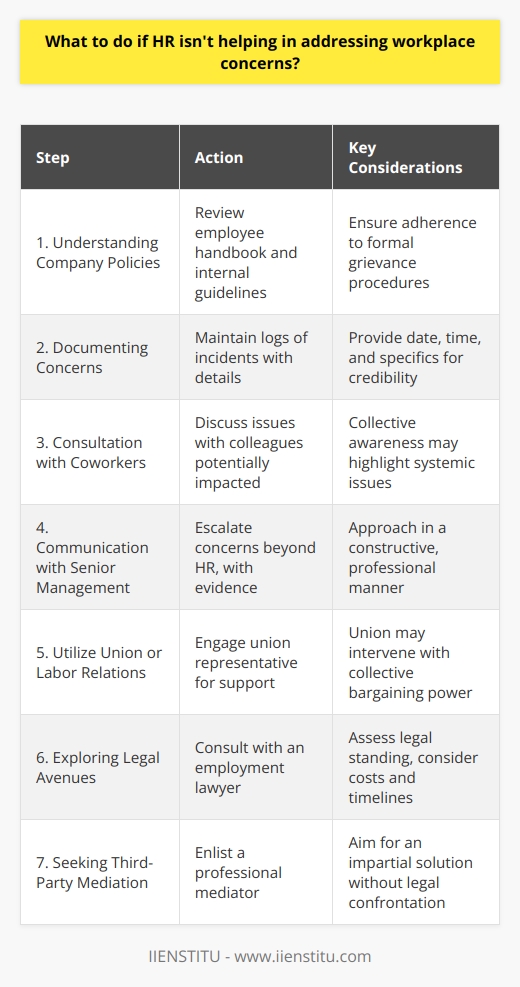
How do you deal with a corrupt HR department that may be contributing to organizational issues?
Identifying Corruption
When dealing with a corrupt Human Resources (HR) department, it is vital to first confirm the existence of corruption. Detecting irregularities, such as bias or fraudulent activities, can serve as starting proof.
Collecting Evidence
Once you identify corruption, the next step is gathering evidence. Ensure to document all incidents, instances and patterns reflecting corruption. This includes emails, memos, or any other form of communication that binds.
Anonymous Reporting
After gathering evidence, deliver it through the right channels. Anonymously report corruption to higher-level management or compliance officers. Whistle-blowing systems also offer platforms for anonymous reporting while ensuring protection for the whistle-blower.
Co-worker Collaboration
Involve coworkers who may also be victims or witnesses of the corrupt activities. Their experiences can strengthen your case, and it provides a united front against corruption.
Involve Legal Aid
If no action seems forthcoming after reporting, you may need to involve legal counsel. They can offer guidance and represent your interests, especially when dealing with complex corporate corruption.
Engaging Third Party
Consider bringing in an outside, impartial party to audit the HR department. This audit could help expose corruption that might otherwise remain hidden within the organization.
HR Reformation
Finally, propose HR reformation. This will mitigate the reemergence of similar corruption in the future. The reformations can involve installing new corruption-resistant policies or even restaffing the HR department.
In conclusion, fighting HR department corruption requires a well-planned, carefully executed strategy. This process often involves a combination of evidence collection, anonymous reporting, legal action, third-party auditing, and HR reformation. Every step strengthens organizational integrity, fostering a culture of fairness and transparency.
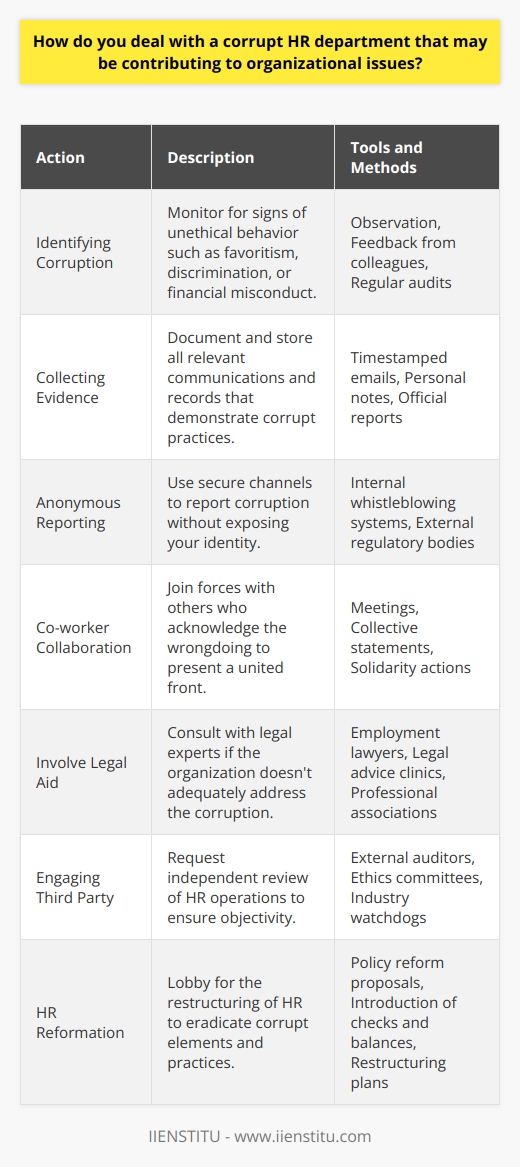
What are the primary reasons HR professionals may feel dissatisfied or overwhelmed in their roles?
Workload and Time Pressures
One of the key reasons for dissatisfaction among HR professionals is workload. They often juggle multiple duties like recruitment, benefits administration, and organizational development. This high demand can lead to work overload, leading to stress and dissatisfaction. Additionally, tight deadlines and insufficient time to complete tasks can heighten their anxiety levels.
Lack of Authority
Another significant issue is the lack of authority in decision-making. HR often remains at the periphery of strategic decisions with their expertise underutilized. This lack of recognition may exacerbate dissatisfaction among HR professionals.
Limited Resource Access
Limited access to resources is another problem. HR often faces budget and resource constraints, making it hard to deliver proficient services. This may result in a feeling of under-performance, generating dissatisfaction.
Conflict Resolution
HR professionals commonly play the role of conflict-resolvers. Facing daily confrontations and dealing with difficult personalities can be draining. Constantly resolving disputes may create an unfavorable atmosphere, leading to job dissatisfaction.
Inefficient HR Systems
Inefficient HR systems can also be problematic. HR professionals may feel overwhelmed if they have to work with outdated or inefficient HR systems. They may be dissatisfied if modern technology is not available to simplify their tasks.
Inequitable Compensation
Compensation inadequacy may emerge as another vital reason for HR dissatisfaction. If HR professionals perceive that their remuneration does not match their workload or duties, it can lead to a demoralized workforce.
It's important to identify and address these issues. Adequate interventions, such as effective work distribution, allocating appropriate budgets, and providing modern technology can help increase job satisfaction among HR professionals.
